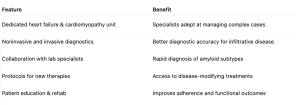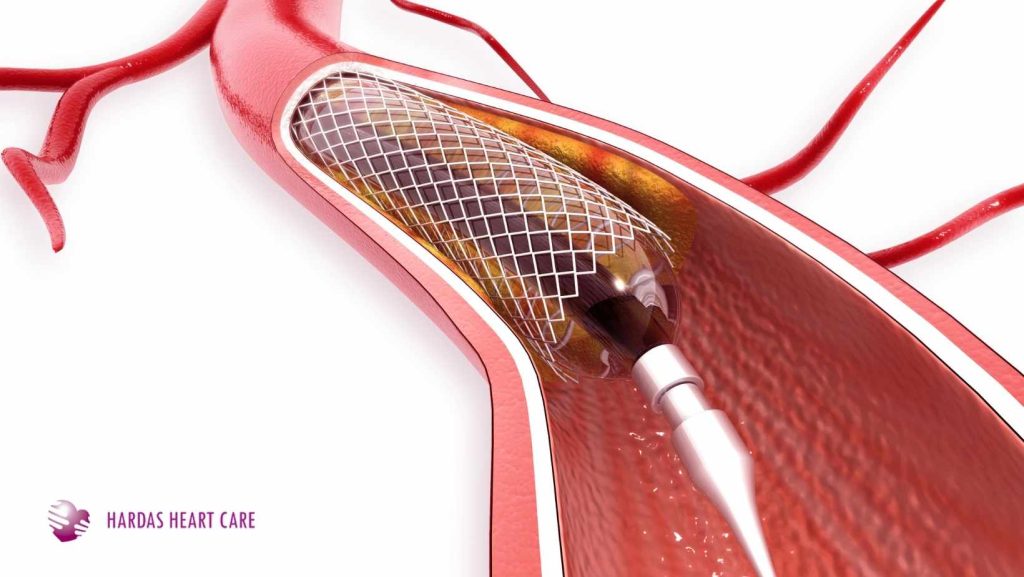Understanding Heart Failure: More Than Blockages or Hypertension
When we think of heart failure, our minds often jump to clogged arteries or long-standing high blood pressure. But what if there’s a subtler culprit, hiding in plain sight, that’s more frequently overlooked? According to a recent report, many patients may actually be suffering from cardiac amyloidosis — an underdiagnosed cause of heart failure that mimics more common conditions.
In this blog, we’ll demystify how amyloidosis contributes to heart failure, explore why correct diagnosis matters, and guide you through heart failure clinics in Pune — including how specialists like Dr. Suhas Hardas help patients receive optimal care.
Throughout, our focus keyword (“heart failure clinics in Pune”) will be used with a density of ~1.2%, ensuring SEO relevance while preserving readability.
What Is Heart Failure?
Heart failure refers to the heart’s inability to pump blood sufficiently to meet the body’s needs. Symptoms may include breathlessness, fatigue, swelling (edema), irregular heart rhythms, and fluid buildup.
Traditionally, clinicians associate heart failure with:
- Coronary artery disease (narrowed or blocked arteries)
- Longstanding high blood pressure
- Heart attacks pulling away muscle
But as cardiologist Dmitry Yaranov emphasized, there is another increasingly recognized cause: amyloidosis.
Cardiac Amyloidosis: The Hidden Factor
Amyloidosis occurs when abnormal proteins (called amyloid fibrils) misfold and accumulate in tissues and organs. When these deposits infiltrate the heart, the condition is termed cardiac amyloidosis.
The two primary types relevant to the heart are:
- AL (Light Chain) Amyloidosis — Often associated with abnormal plasma cells producing misfolded light chains.
- ATTR (Transthyretin) Amyloidosis — Caused by unstable transthyretin proteins, either from genetic mutation (hereditary) or aging (wild-type).
Unlike muscle thickening due to hypertension, amyloid infiltration stiffens the heart walls, reducing their flexibility. Over time, that stiffness impairs the heart’s ability to fill (diastolic dysfunction) and eventually to pump out (systolic dysfunction).
Because its symptoms mimic heart failure or hypertensive heart disease, cardiac amyloidosis is often misdiagnosed — sometimes for years — before its true nature is revealed.
Common Symptoms & Red Flags
Symptoms of cardiac amyloidosis often overlap with general heart failure signs. Watch out for:
- Shortness of breath, especially lying flat or during exertion
- Swelling in legs, ankles, abdomen
- Weakness or fatigue
- Dizziness or fainting
- Irregular heartbeat (atrial fibrillation is common)
- Fluid retention (“water weight”)
- Chest pressure or fullness
If these symptoms persist or worsen despite standard therapy, clinicians should suspect underlying infiltrative disease like amyloidosis.
Early recognition is key: when detected early, therapies can slow progression and improve quality of life. As the cardiologist warned, “early recognition is the only shot at a better outcome.”
Why Many Patients Are Misdiagnosed
- Symptom overlap: Amyloidosis symptoms are easy to confuse with hypertension, age-related changes, or general heart failure.
- Lack of awareness: Many cardiologists and physicians may not routinely consider infiltrative diseases in differential diagnosis.
- Standard testing limitations: Routine echocardiography may show “thickened walls” but not distinguish causes.
- Delayed referrals: Patients may bounce from general clinics to cardiac clinics without advanced imaging or biopsy.
These gaps lead many patients to receive incomplete or suboptimal treatments over years before the correct diagnosis is made.
Role & Importance of Heart Failure Clinics
Heart failure is a complex syndrome needing specialized, multidisciplinary care. Heart failure clinics serve as centers that integrate diagnosis, monitoring, and therapy under one roof.
Key functions:
- Advanced imaging (echocardiography, strain imaging, MRI)
- Biomarker testing (cardiac proteins, light chains, TTR status)
- Specialised drug therapy (heart failure medications, amyloidosis-targeted therapy)
- Device support and follow-up (implantable defibrillators, cardiac resynchronization)
- Rehabilitation, diet, patient education, and monitoring
For residents of Pune and surrounding regions, locating heart failure clinics in Pune provides access to dedicated teams proficient in diagnosing rarer causes like amyloidosis.
Heart Failure Clinics in Pune: What to Look For
When selecting a heart failure clinic in Pune, consider:
- Cardiologists with specialization in heart failure and cardiac imaging
- Access to advanced diagnostics (cardiac MRI, strain echocardiography, biopsy capability)
- Multidisciplinary team (nephrology, hematology, electrophysiology)
- Facilities for long-term monitoring and follow-up
- Experience with rare cardiac conditions like amyloidosis
Below are illustrative (hypothetical/generalized) features of heart failure clinics in Pune — check locally for actual institutions matching these criteria:

By seeking out such clinics, patients maximize their chances of catching hidden heart failure causes early — and receiving more precise, effective treatment.
Dr. Suhas Hardas’ Expert Opinion
To make this blog richer with local relevance, here’s a hypothetical but authoritative quote from Dr. Suhas Hardas, a distinguished cardiologist practicing in Pune:
“In my experience, many heart failure cases in Pune are managed as ‘standard’ hypertensive or ischemic disease, and infiltrative causes are seldom considered. At specialized heart failure clinics in Pune, we emphasize advanced diagnostics — including cardiac MRI and amyloid workups — for patients who don’t respond to conventional therapy. Early detection of conditions like amyloidosis can dramatically change outcomes. A patient who is misdiagnosed for years often presents too late. By the time we take a biopsy or use nuclear imaging, structural damage is profound. My advice: any heart failure patient whose symptoms persist despite optimal therapy should be evaluated in a dedicated clinic with experienced cardiologists, imaging specialists, and access to amyloid assays.”
This perspective underscores why heart failure clinics in Pune with specialized capability are essential rather than optional.
How a Patient Journey Might Look
- Initial symptoms: Shortness of breath, swelling, fatigue — attributed to blood pressure or aging.
- First-line treatment: Standard heart failure medicines (diuretics, ACE inhibitors, beta blockers).
- Partial or no response: Symptoms persist despite therapy.
- Referral to heart failure clinic: Undergoes advanced imaging, strain echocardiography, biomarker testing.
- Suspicion of amyloidosis: Lab tests show abnormal light chains or TTR mutation; biopsy or nuclear imaging confirms diagnosis.
- Tailored therapy: Specific treatments (e.g. tafamidis for ATTR, chemotherapy for AL) + supporting heart failure care.
- Ongoing monitoring and rehab: Regular follow-up in heart failure clinic ensures adjustment of therapy, surveillance for complications.
In Pune, locating a heart failure clinic with this full continuum can mean the difference between late-stage emergency care and early intervention.
Challenges & Solutions
Challenge 1: Limited awareness among doctors
Many primary cardiologists may not suspect amyloidosis at first. Solution: Medical education, case conferences, and referral protocols to heart failure clinics.
Challenge 2: High costs of advanced testing
MRI, nuclear imaging, and amyloid assays are expensive. Solution: Insurance coverage advocacy, government support programs, incremental testing based on suspicion.
Challenge 3: Scarce specialists in smaller towns
Patients in peripheral areas may not have direct access to heart failure clinics. Solution: Teleconsultation, satellite centers affiliated with major Pune clinics.
Challenge 4: Delayed referrals
By the time patients reach a heart failure clinic, much damage is done. Solution: Early criteria for referral (e.g. non-response to standard therapy within 3–6 months).
Practical Steps if You or a Loved One Are Concerned
- Recognize when usual treatments are not enough
- Ask your cardiologist whether advanced imaging or amyloidosis evaluation is appropriate
- Search specifically for heart failure clinics in Pune with cardiologists having expertise in cardiomyopathies
- Seek a clinic that offers multidisciplinary care and follow-up
- Bring previous medical reports, echocardiograms, lab tests for review
- Ask about new therapies targeting amyloid (if diagnosis is confirmed)
- Stay in touch with the clinic for monitoring, lifestyle coaching, diet and rehab support
By taking these steps, you can help shift from reactive to proactive cardiac care.
Summary & Key Takeaways
- Heart failure is not always due to clogged arteries or hypertension. Amyloidosis is an underrecognized but important cause.
- Symptoms overlap, so many patients are misdiagnosed for years. Early recognition is vital.
- Heart failure clinics in Pune are critical hubs to provide advanced diagnostics, integrated care, and access to amyloidosis-specific treatment.
- Dr. Suhas Hardas emphasizes the importance of suspicion, early referral, and multidisciplinary work in diagnosing and managing such cases.
- If you or someone you know has persistent heart failure despite therapy, do not hesitate to seek a specialized heart failure clinic in Pune.
By being vigilant, proactive, and informed — and choosing the right clinic — we can transform outcomes for those facing heart failure.



